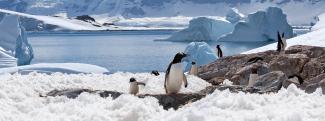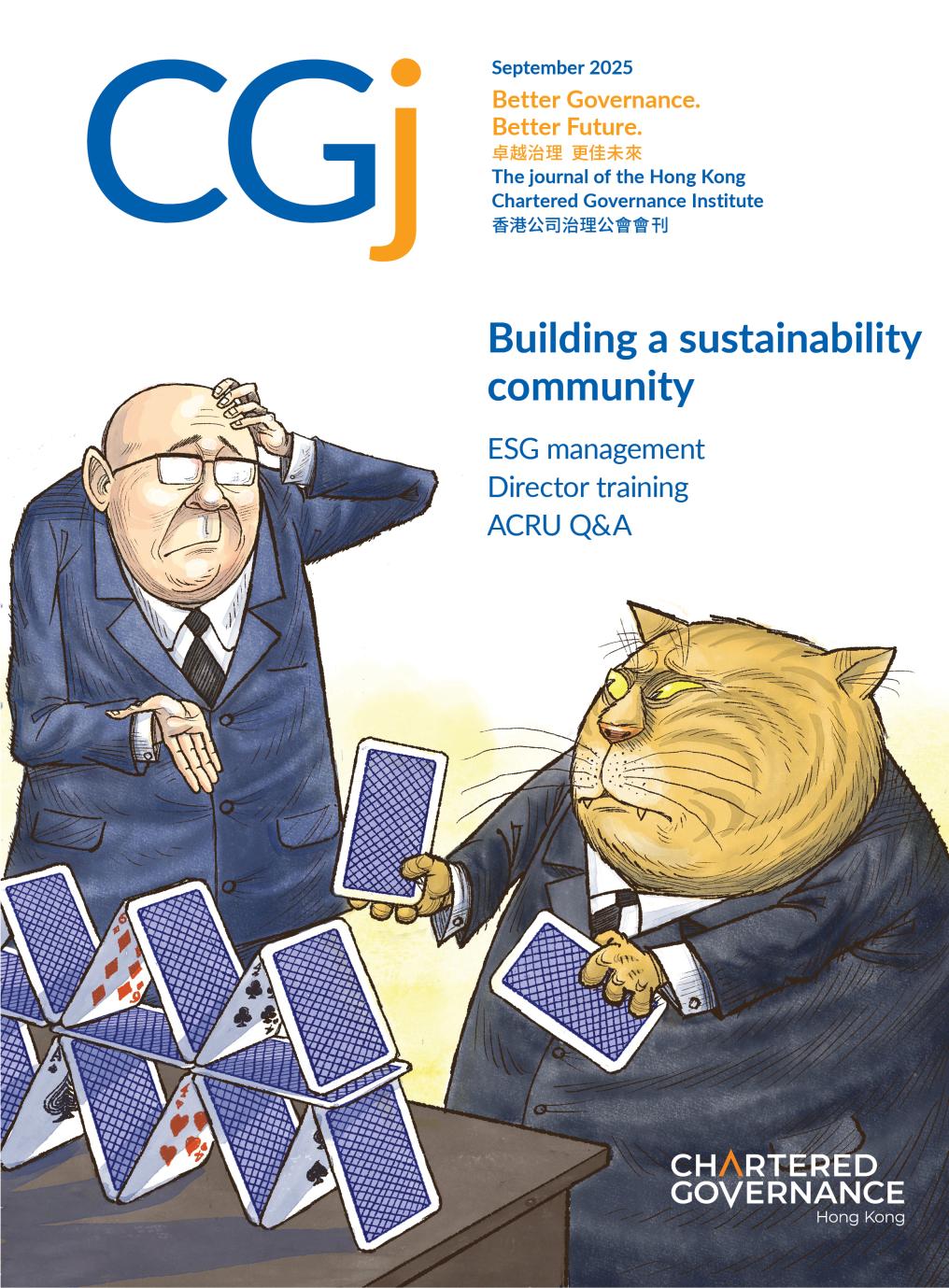
Building a sustainability community
At the first annual update and cocktail reception for the Sustainability Governance Academy, guest speaker Wen Xu, Polar Science Explorer, Climate Action Advocate and Cofounder of Polar Hub, shared his first-hand experience of the urgency of sustainability governance.
Highlights
- the Sustainability Governance Academy is a vibrant and influential community of professionals committed to integrating sustainability into organisational governance
- Wen Xu, the first Chinese national to trek solo across Antarctica, shared his first-hand experience of glacier retreat and urged a deeper connection between nature and sustainability governance
- with Hong Kong’s new climate disclosure requirements in force and nature-related standards on the horizon, governance professionals are preparing for an expanded ESG ecosystem that includes biodiversity and assurance
First-year milestones
When the Institute launched its Sustainability Governance Academy (the Academy) on 31 July 2024, it did so with a bold but clear purpose – to build a dedicated platform for professionals committed to integrating sustainability into governance. One year on, the Academy has quickly grown into a vibrant and influential community, uniting certification holders of the Institute’s ESG Reporting Certification Course, industry leaders and sustainability governance professionals across sectors and borders.
At its first annual update and anniversary gathering held on 29 July 2025, Institute members, regulators and corporate leaders came together to celebrate the Academy’s first-year milestones and to look ahead to the evolving ESG and sustainability landscape. ‘We set out with a clear vision, to equip professionals from all sectors with the knowledge, tools and network needed to integrate sustainability into organisational governance,’ said David Simmonds FCG HKFCG, Institute President, Academy Advisory Board member, and Chief Strategy, Sustainability and Governance Officer of CLP Holdings Ltd, in his opening remarks.
The Institute’s flagship ESG Reporting Certification Course is a cornerstone of the Academy’s success. All individuals who have successfully completed the course are entitled to register with the Academy to become one of its Sustainability Professionals.
With nearly 1,800 professionals certified to date on the ESG Reporting Certification Course, and with the seventh cohort now open for enrolment, the course has become a trusted standard for equipping governance professionals with forward-looking knowledge and practical skills in ESG reporting and related sustainability issues. An advanced refresher course is also available for certification holders from the first to fourth cohorts, ensuring that members stay up to date with fast-moving developments such as the International Sustainability Standards Board (ISSB)’s global baseline for climate-related disclosures (IFRS S1 and IFRS S2), the Taskforce on Nature-related Financial Disclosures (TNFD) and biodiversity-related reporting requirements.
The Academy is growing into a true community of sustainability practice. Over 700 certification holders have formally joined as Sustainability Professionals so far, engaging in peer networking, site visits, curated resources and video Q&A sessions with the Academy Advisory Board. The Academy has also launched new digital learning tools and case-based video content under its From Policy to Practice: Sustainability in Action series, showcasing how organisations are implementing sustainability principles on the ground. With the Academy’s continued focus on emerging areas, such as biodiversity, climate resilience and just transition, it aims to serve not just as a knowledge hub but as a catalyst for change across sectors in Hong Kong, the Chinese mainland and beyond.
‘Sustainability governance is far more than a compliance exercise,’ said Mr Simmonds. ‘It’s about embedding sustainability into decision-making so that lasting value is created, not only for shareholders but also for the broader community and the environment we all share.’
“The Academy is growing into a true community of sustainability practice.”
The front lines of climate change
While the Institute and its Academy continue to drive forward best practices in sustainability governance, disclosure and professional development, this year’s annual update and the first anniversary of the Academy also offered something more visceral – a reminder of what is truly at stake when we talk about climate change. That reminder came from Wen Xu, a polar scientist, mountaineer and the first Chinese explorer to trek solo to the South Pole without external assistance.
Mr Xu’s presentation grounded the sustainability conversation in real-world experience and environmental urgency.
While much of the discourse around sustainability governance focuses on frameworks, disclosures and strategy, Mr Xu brought the conversation back to the raw force of nature and the human drive to protect it. His journey, both physical and philosophical, took him from the icy peaks of China’s western mountains to the heart of Antarctica, where he saw at first hand the rapid and irreversible changes brought by global warming.
At just 14 years old, Mr Xu fell in love with mountaineering and the solitude of snow-covered peaks. That passion would lead him to becoming a professional climber, joining the Chinese National Mountaineering Team and even participating in the Olympic torch relay to the summit of Everest. But it wasn’t until after university that he began to question the meaning behind his climbs. ‘I asked myself, what is the point of all this climbing? I realised what I truly loved was not conquering mountains, it was understanding nature.’
That question set him on a new path – one of science. He began studying glaciology and eventually joined the Chinese Academy of Sciences as a glaciology researcher.
In 2017, while conducting fieldwork at 5,500 metres above sea level, he fell through a thin layer of ice into a glacial moulin – a deep, vertical shaft carved by meltwater. Carrying 20 kilograms of research equipment on his back, he barely managed to escape. That 20 seconds changed the direction of his life.
Mr Xu said he had already observed the steady retreat of glaciers across the Tibetan Plateau. He had climbed Muztagh Ata, a 7,546-metre peak in Xinjiang, 13 times over the years. ‘In the early 2000s, you’d sink thigh-deep into snow. But during my last climb, you didn’t need snowshoes at all. The glacier had turned to bare ice.’ These transformations weren’t isolated. On a ski expedition to the North Pole in 2009, Mr Xu noticed the sea ice had thinned dramatically, down from five metres thick to just three within five years. ‘By 2030, summer sea ice in the Arctic may be nearly gone,’ he said.
After his near-death experience, Mr Xu resolved to turn his personal explorations into climate action. He launched a bold campaign, a multiyear journey to raise awareness of glacier retreat through first-hand observation and science. In 2018, he summited Everest, not just as a climber but as a scientist, collecting ice core samples from the peak for the first time ever. He went on to cross Greenland and, in 2019, became the first Chinese national to complete a solo, unsupported crossing of Antarctica, walking 1,500 kilometres on foot.
After returning to China, he founded an NGO called Polar Hub (极地未来) and launched the Memory of Glaciers project (冰川记忆), which seeks to preserve ice cores from disappearing glaciers as climate archives for future generations. ‘Even if we keep warming below 1.5°C, glaciers will continue to melt. We need to save what we can now.’
His team also works with the Ministry of Ecology and Environment of the People’s Republic of China to lead youth-focused scientific expeditions into nature, aligned with the United Nations’ Nature-based Solutions (NbS) approach. ‘You can’t protect what you don’t understand,’ Mr Xu pointed out. ‘We take young people into nature so they can learn, observe and act.’
Mr Xu closed with a stark reminder that the Earth has experienced five mass extinctions in its 4.6-billion-year history. ‘Some scientists say we’re already entering the sixth, driven by human activity, emissions and our impact on nature,’ he explained. ‘If that’s true, then everything we do, every policy, every business decision now matters more than ever.’
The road ahead
Regulatory and market expectations are catching up with the findings of environmental science that people such as Mr Xu have long warned about. In the past year, two major developments have underscored the growing emphasis on nature and biodiversity-related risks.
- The TNFD released its final recommendations in September 2023. Much like the now defunct Task Force on Climate-related Financial Disclosures did for climate, the TNFD provides a framework for companies to identify and disclose dependencies and impacts on nature, ecosystems and biodiversity.
- The ISSB, in its March 2024 update, signalled its intention to include nature and biodiversity in its future research to determine whether these should be incorporated into its standards, indicating that climate is just the beginning of a broader environmental disclosure ecosystem.
As global standards shift from a carbon-only focus to a wider lens that includes ecosystems, water use and nature loss, Hong Kong is also positioning itself to stay ahead.
Effective from 1 August 2025, the Hong Kong Sustainability Disclosure Standards (HKFRS S1 and HKFRS S2), which are fully aligned with the ISSB standards, are now in place for voluntary application. While the adoption of these standards is not yet mandatory, they are designed to pave the way for full compliance by large publicly accountable entities, including listed companies and major financial institutions, by 2028, as set out in the government’s sustainability disclosure roadmap.
To support this transition, the climate-related disclosure requirements under the ESG reporting framework of The Stock Exchange of Hong Kong Limited, in line with IFRS S2, have also come into effect, marking the first step in a phased approach toward mandatory ISSB-aligned sustainability reporting. These rules introduce enhanced expectations around Scope 3 emissions, scenario analysis and financial impact disclosures, all of which will require listed companies to strengthen their data collection, internal controls and governance processes.
On the assurance front, momentum is also building. The Accounting and Financial Reporting Council will launch a consultation later this year to determine how sustainability assurance should be regulated in Hong Kong, including who may provide such services and under what standards. As of now, the Hong Kong sustainability assurance standards, also fully convergent with international benchmarks, are available for voluntary adoption, but mandatory assurance may soon follow.
While some requirements remain voluntary for now, the direction of travel is clear. Hong Kong is moving decisively toward full alignment with international sustainability disclosure and assurance standards, with regulatory scaffolding already in place to support a comprehensive, mandatory regime in the coming years.


